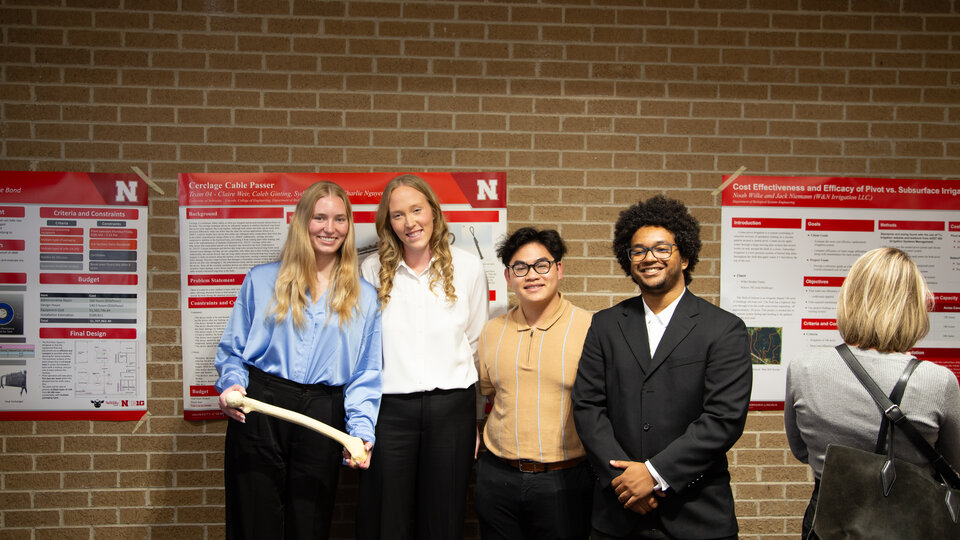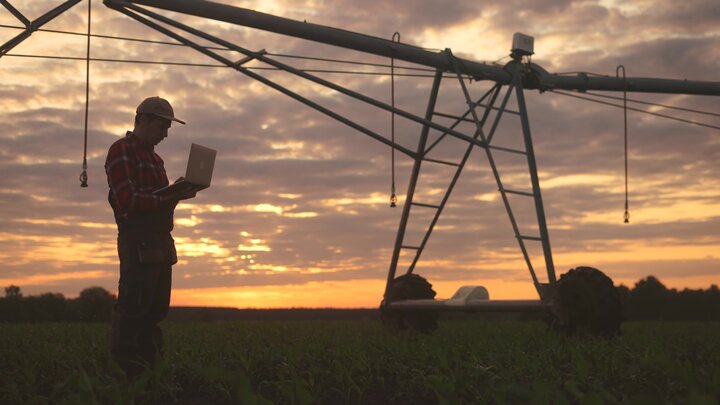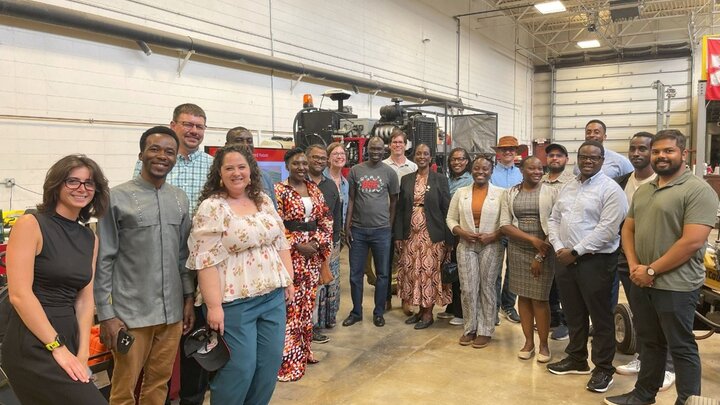Explore our Programs
Majors
Agricultural Engineering
As an agricultural engineer, you'll blend a passion for the outdoors with expertise in biology, mathematics, and cutting-edge technology. Your work will help meet society's crucial needs: food, water, energy, and sustainable natural resources.
Areas of Focus:
machine design, natural resources and irrigation engineering, and smart and autonomous systems
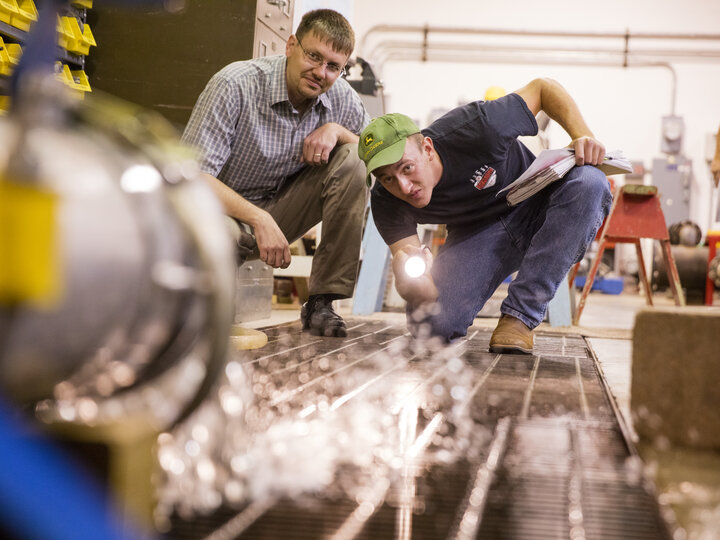
Agricultural Systems Technology
Agricultural Systems Technology stands at the cutting edge of innovation, equipping you with knowledge of the latest technology, agricultural science, and business practices. This field enables you to solve agricultural challenges and address related industry needs for the 21st century and beyond.
Minor(s):
This interdisciplinary major allows students to pursue minors in areas such as: digital agriculture, precision agriculture, agribusiness, agricultural economics, and more
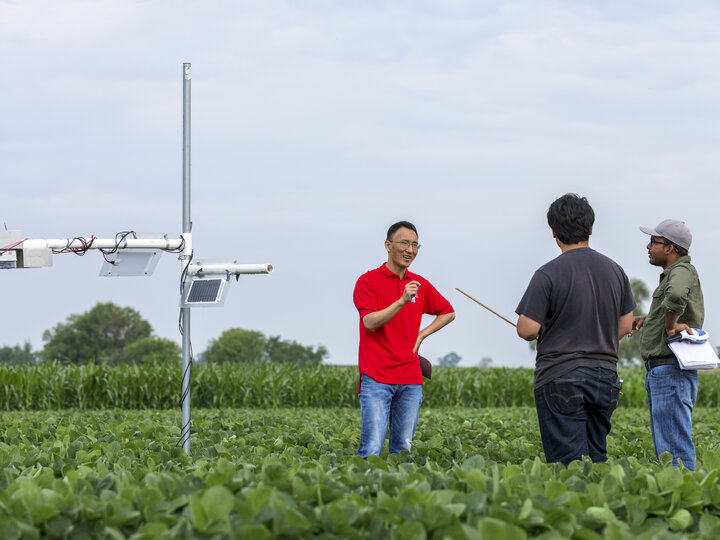
Biological Systems Engineering
Biological systems engineering integrates biology and engineering principles to address societal challenges. By understanding biological phenomena, you will work across disciplines to solve complex problems.
Areas of Focus:
biomedical engineering, ecological and environmental engineering, and food and bioprocess engineering

Minors
To explore minors in CASNR and College Of Engineering, visit the CASNR Catalog and College Of Engineering Catalog. Students should consult their academic advisors to determine which minors best align with their goals.
Scholarships
Department Scholarships
In addition to being eligible for scholarships awarded by the University of Nebraska - Lincoln (UNL), the College of Engineering (COE) and the College of Agricultural Sciences and Natural Resources (CASNR), students can receive scholarships awarded by the Department of Biological Systems Engineering.
- There are over 25 named scholarship funds.
- Some are based on financial need.
- Some are renewable.
- Some require an application to the Department.
- Many have eligibility requirements or restrictions.
- Almost $100,000 is awarded annually.
These scholarships are normally reserved for sophomores, juniors and seniors in the Agricultural Engineering, Biological Systems Engineering, and Agricultural Systems Technology degree programs in the department. With only a few exceptions, written applications for these scholarships are not possible, nor are they required. Some, but not all, of these require assessment of financial need and thus require a FAFSA (Free Application for Federal Student Aid) submission.
The Office of Scholarships and Financial Aid website provides details on additional scholarships and how to apply.
Contact Dr. Deepak Keshwani (dkeshwani2@unl.edu) for more information on scholarships offered by the department.
NO PLACE LIKE NEBRASKA
Our Student-centered small classes provide an immersive learning experience

A Hands on Approach to Learning
Students are encouraged to participate in numerous hands-on learning opportunities. With the guidance of their advisors, they can find the best options to complement their academic and personal interests as well as their career goals. These opportunities may include in-class labs, student organizations, research projects, and national or international competitions. There are always opportunities for students to get involved.

Huskers Do Big Things
Our diverse student population continue to thrive and lead in different roles and fields. The following represents a sample of the internships, jobs and graduate school programs that current students and recent graduates have reported.
Agricultural Engineering
Jobs
- Engineering Development Program-Product Engineer, John Deere - Cedar Falls, IA
- Production Engineer, Kawasaki Motors Manufacturing - Lincoln, NE
- Water Resources Project Engineer, JEO Consulting Group - Lincoln, NE
Internships
- Biological Research Assistant, USDA - Lincoln, NE
- Intern, Southwestern Company - Nashville, TN
- Test Engineer, AGCO - Jackson, MN
Graduate & Professional School
- Ms in Agricultural and Biosystems Engineering, University of Nebraska-Lincoln - Lincoln, NE
- Ph.D., Electrical Engineering, University of Texas at Austin - Austin, TX
Agricultural Systems Technology
Jobs
- Operations Management LDP, Ardent Mills - Kenosha, WI
- Production Supervisor, Land O'Lakes - Harrisburg, PA
- Product Support Technician, Lindsay Manufacturing - Lindsay, NE
Internships
- Product Support Intern, John Deere - Ottumwa, IA
- Test Engineer Assistant, Global Industries - Grand Island, NE
- Equipment Testing Technician, CLAAS - Omaha, NE
Graduate & Professional School
- M.S. Agricultural and Biological Engineering, Purdue University, West Lafayette, IN
- Ph.D., Engineering, University of Nebraska-Lincoln - Lincoln, NE
Biological Systems Engineering
Jobs
- Research associate, Mayo Clinic, Rochester, Minnesota
- Biological engineer, MatMaCorp, Lincoln, Nebraska
- Water resource engineer, HDR, Denver, Colorado
Internships
- Biological systems engineering co-op, NASA Johnson Space Center, Houston, Texas
- Environmental science intern, HDR, Omaha, Nebraska
- R&D hematology intern, Streck, Omaha, Nebraska
Graduate & Professional School
- M.D. and Ph.D., Medical Scientist Training Program, University of Wisconsin
- Doctor of Veterinary Medicine, Iowa State University
Frequently Asked Questions
Frequently Asked Questions
What is the difference between ecological engineering and environmental engineering?
Environmental Engineering focuses on the built environment (e.g., water treatment, air pollution), while Ecological Engineering, within Biological Systems Engineering, emphasizes nature-based solutions. Both can lead to careers as environmental engineers, and students may minor in either field.
I’m interested in robotics and automation. Does the department offer a major for that?
Yes, the Agricultural Engineering major offers a Smart and Autonomous Systems emphasis, which focuses on robotics and automation in agriculture. You can also join our robotics competition team.
I have diverse interests in agriculture. Is agricultural systems technology the major for me?
Absolutely! Agricultural Systems Technology blends business, agricultural science, and technology, preparing students for a dynamic agricultural industry by teaching adaptable core concepts across various areas.
Can I major in biological systems engineering if I am interested in medical school, vet school, or other health programs?
Yes. The Biological Systems Engineering degree, paired with the pre-health track at Nebraska, meets most professional school requirements while staying close to the 127 credit hours required to graduate.
How do students get advised in the department?
Students are paired with an Academic Advisor from the start of their degree. After choosing an emphasis area, they are also partnered with a Faculty Career Mentor. The advisor helps with choosing courses and degree planning, while the mentor offers guidance on electives, internships, and career decisions, both ensuring consistent support throughout the degree.
What opportunities are there outside of the classroom?
Students can join clubs like the American Society of Agricultural and Biological Engineers and the Biomedical Engineering Society, participating in design teams, field trips, and networking opportunities with industry partners.
People
For more information on undergraduate degree programs contact
BEGIN YOUR HUSKER JOURNEY TODAY

